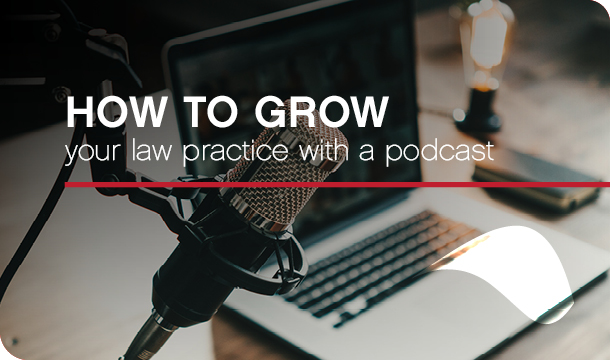How to grow your law practice with a podcast
When our Principal and President Michelle Calcote King began Reputation Ink’s “Spill the Ink” podcast in November of 2020, she wanted to try something new. Over several episodes, she began to see the benefits of the podcast, and stuck to it. Now with more than 70 episodes, Michelle has learned a lot about the benefits of podcasting, particularly in the legal field. Her number-one benefit she says? Networking.
There are many other benefits as well – here’s Michelle’s top five reasons why law firms and attorneys should consider creating a podcast:
1. Make networking less of a chore
Attorneys must build strong referral networks and relationships to build their practices. This often involves networking, usually after hours. While networking is effective, it takes time. And there’s no guarantee you’ll get quality face time with the people you most want to network with. What if networking could be made easier? There’s a solution: podcasting can easily replace long networking events, happy hours or workshops.
While podcasting is still work, it is also a form of networking. Every time you reach out to someone or have them on your podcast, you’re making a new connection (and hopefully leading to an ongoing relationship). Podcasts are not just a one-way communication channel; they’re an opportunity to collaborate and connect with other legal professionals, referral partners and industry influencers. Inviting guests who are experts in various legal fields to share their knowledge on your podcast opens doors for valuable connections. By engaging in meaningful conversations, you not only tap into their expertise but also nurture relationships that can lead to future collaborations, referrals and mutual support. People are often flattered by being asked to participate, and it’s an easy lift — usually no more than a half hour — on their end.
2. Establish thought leadership in your practice
If you’re not sure what to podcast about, don’t worry! Your podcast should focus simply on where your expertise and your clients’ needs overlap. Think about the kinds of questions your clients frequently ask you or your favorite practice area and type of work, then focus on interviewing people in that space. For example, while we are primarily a public relations agency, we know our audience is interested in a range of marketing topics, and there are experts (who aren’t competitors of ours) who can address them. We also love to interview in-house marketers and managing partners so our listeners can hear from people in the trenches. By bringing together experts and leading discussions with them, you gain credibility and authority by association.
When it comes to connecting with potential clients, fellow legal professionals or industry influencers, podcasting provides a unique opportunity to reach a captive audience. People are increasingly tuning in to podcasts during their daily commute, workouts or leisure time. By hosting a podcast, you can engage with listeners who are genuinely interested in legal topics, positioning yourself as a knowledgeable and trustworthy resource. Your podcast becomes a virtual stage where you can showcase your legal expertise and connect with individuals who resonate with your message. This enhances your professional brand and opens doors to speaking engagements, panel discussions and media opportunities.
3. It’s easier than you think
“I don’t have time for podcasting, I’m busy enough as is.”
We get it, attorneys are busy. You’re often working on cases, and in the case of billable hours, you can’t bill for podcasting. Business connections are important too (as we’ve talked about already), but what if we told you that podcasting is less time than being on a board or going to various networking events after work or on your weekends?
Podcasting can be done in a fraction of time that other marketing activities require. Attorneys can create the podcast from their homes, their offices at work or another space. Quality audio is important (so we don’t recommend creating a podcast in a noisy coffee shop or on a bus), but it can be done in a variety of places. Some podcasts are also audio-only, which negates the need for video.
If you’re still thinking, “I’m too busy,” don’t worry, we can do the hard work for you! Public relations and content marketing agencies (like Reputation Ink) often provide podcasting production support, such as scheduling interviews, researching guests, drafting questions, editing audio and video files, writing episode summaries, creating social media posts and images for promotion and more. We work with clients to detail a podcasting plan that fits their schedule. If you choose to do so, you could still host your own podcast but only have to show up (at your desk) to record the episode.
4. It’ll help support your long-term business strategy
Podcasting is popular because it works. The legal industry is very relationship-driven, and it’s important to connect with the right people in order to help your firm or business grow. Creating a business strategy and sticking to it is crucial, and podcasting can help nurture relationships over time.
By podcasting, you’re learning from other industry experts. A guest might teach an industry secret, a new way that attorneys use a new technology or a new platform that came out. There’s always something new to learn from others, and this provides the host with easy access to information.
Podcasts also produce a lot of content – from Instagram reels to Facebook posts to Youtube clips – already generated and ready to use. The hard work of creating content is already done, it just needs to be repackaged and posted.
5. You can adjust it to your schedule
Some podcast episodes are released once a month, some once a week or even twice a week. Consistency is key if you’re looking to become a well-known name in the industry, but if you’re podcasting solely for networking, there’s more leeway to choose your own schedule. Of course, it’s important to keep on a consistent schedule to grow followers (and someone might not want to be on a podcast if it is sporadically published… they’re marketing themselves too), but you’re able to set your own schedule, whether it is monthly, weekly or quarterly. Podcasting doesn’t have to be forever; there isn’t a two-year commitment to start one, and there are no issues with ending a series because it isn’t working out.
Podcasting is another form of social media, and it’s never too late to start. Whether you want to release an episode once every month or two a week, podcasting can be a useful tool in your figurative marketing tool belt.
Have questions about podcasting? Email me at info@rep-ink.com.









